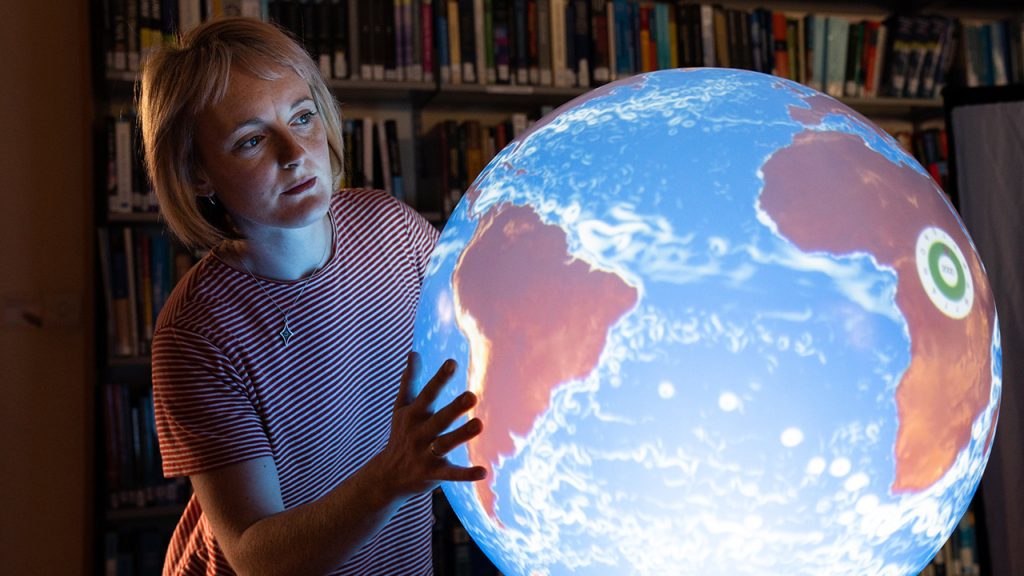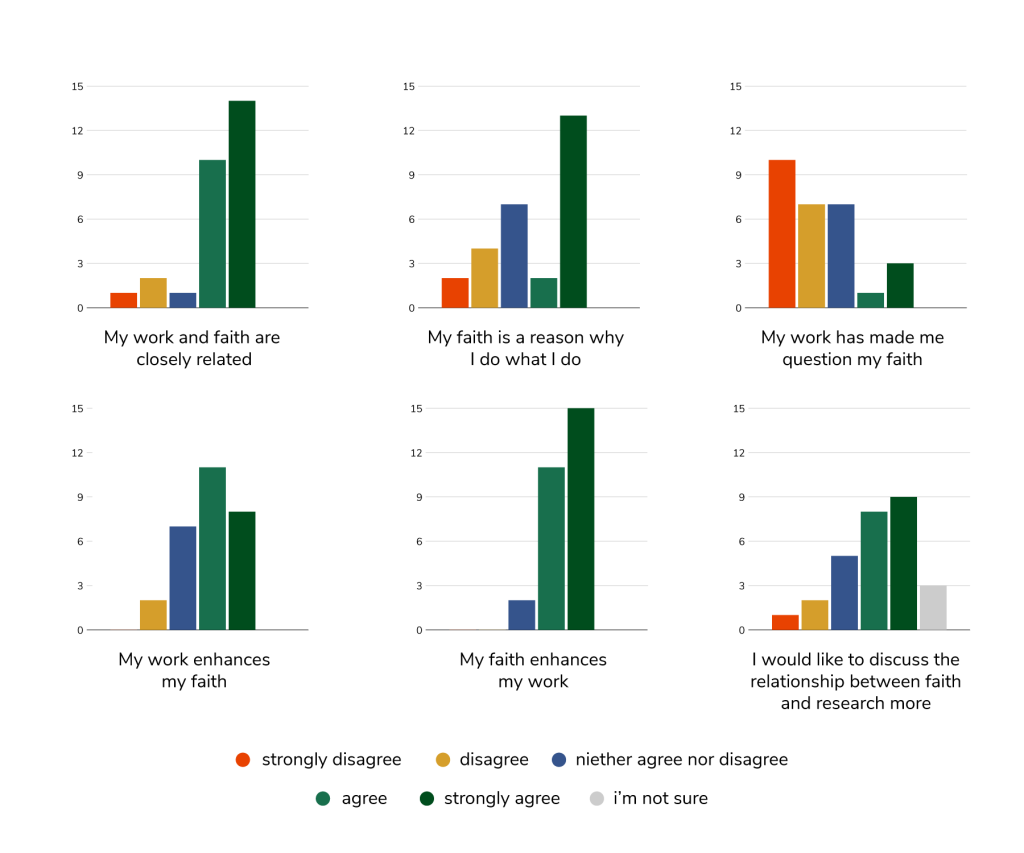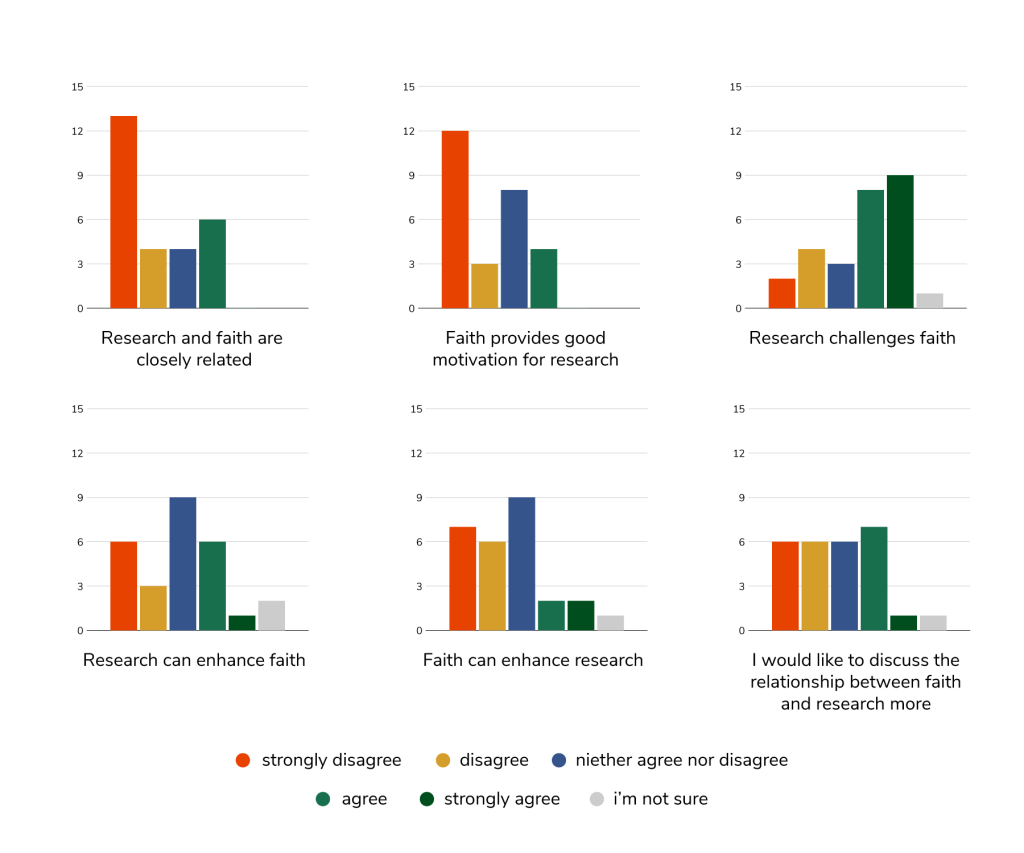
Being faithfully scientific: conversations on faith and science
Bringing science and faith into the same conversation can feel like treading over difficult and unfamiliar terrain.
As with any aspect of a person’s identity, there is a complex – and often changing – relationship between a person’s faith and their work, as both grow and change. People may think that this is more pronounced for a person of faith who works in science.
We know that many people of faith find it difficult talking about faith to their research community. Yet, faith should not be taboo – it shapes the values and behaviours of billions of people worldwide. For many people, their identity as a person of faith coexists alongside – even enhances – their roles in environmental research.
I’m Dr Lydia Messling, a climate communications specialist, and I recently set out to explore what faith means to people who work in environmental science.
To open up conversations on faith and science, I explored how people with – and without – faith in the research community see the relationship between science and faith. And according to the experiences people shared with me, I have summarised some of the ways that faith and science can overlap, conflict, and enhance each other.
I surveyed people from fieldwork researchers to data engineers earlier this year. Over fifty people responded to share their views.
Our results, although by no means a representative sample, did provide plenty to think about. Indeed, it became a challenging task to narrow down only a few aspects of the themes, personal reflections, and insights that emerged.
By sharing a small snippet of our quantitative responses and in-depth interviews, I would like to open a brief window into one of the most foundational aspects that people chose to talk about in almost every response – the fundamental relationship between faith and science.
When we asked people their views on the compatibility between science and faith – perhaps unsurprisingly – we found that their response was closely connected to whether they had a faith or not.
People with a faith could see a close relationship between their faith and science.
There were 28 respondents who said they had a faith. We asked how far they agreed with a series of statements to find out how they would describe their relationship between their faith and work.
Respondents with faith

On the other hand, those without a faith believed there was no close relationship between faith and science.
There were 27 respondents who said they had no faith or were not sure. We asked them how far they agreed with a slightly different set of statements to find out how they would describe the relationship between faith and research.
Respondents without faith

Most people with a faith agreed or strongly agreed that their work enhanced their faith, and that their faith enhanced their work too.
However, people without a faith perceived research as a challenge to faith, and were less certain about whether faith and research had any enhancing effect on each other.
I met several respondents for a brief chat to understand a bit more about their experience and reasoning for their views.
For Stuart, Professor of Geospatial Engineering in the Nottingham Geospatial Institute, “science and engineering is very logical and evidence based. You find data to test a theory and make your conclusion, this is a process I can believe in. Faith doesn’t do this. I can see there being a role for faith in explaining the unknown, but as science advances and reduces what is unknown, the space for faith decreases.”
But for others, scientific advancement is not something that necessarily challenges or pushes back the boundaries of faith. Indeed, the relationship is not a competition where the two are incompatible with each other, but faith and science can exist together and enhance each other.
Kelly, an agro-ecologist at Rothamsted Research, has found that her pagan faith helps her to keep an open mind. She explains:
“The more I go through science, the more I see harmony with my beliefs with the cycle of nature and how everything is interconnected. Evolution is brought up a lot as a reason against having a faith – but I don’t see my beliefs as being against evolution. Evolution explains how species fit together and there’s room for a governing force guiding that.”
All of the interviewees I spoke to mentioned evolution as a point of conceived conflict or perceived incompatibility between science and faith. But, for Sarah, evolution is the best fit for explaining what is going on.
“Whilst I was brought up to believe that evolution wasn’t compatible with having a faith, through looking at the evidence myself and learning from other scientists with a faith, I believe in a God that made evolution and I can see how God gives instructions in DNA. I believe in a creator and in creations’ design to evolve,” says Sarah, a Postdoctoral researcher at the School of Life Sciences, University of Warwick.
Many have written about how science can provide theories to what and how questions, but fails to answer why – this is the more familiar domain of faith. In this sense, evolution can explain the what and how, but only faith explains the why. Whilst science can advance our understanding of the what and how, it will never know to give reason to the why – as explored by John Polkinghorne in a short interview on YouTube.
Another aspect of faith that resonated with people working in environmental science was motivation and inspiration.
Of course, there are many motivations for research – but, faith and moral philosophy often speak to subjective decisions on the right thing to do, something that science and ‘objectivity’ cannot.
Bear in mind that nobody is advocating for faith to interfere with how conclusions are drawn, only that it inspires a topic of research. For more on the roles of values in science, the Stanford Encyclopedia of Philosophy offers a good starter.
Alison, Professor of Environment Fluid Mechanics from the University of Plymouth, found that her faith “says to consider the poor and vulnerable in our responses.”
“As an engineer, I am able to live out my faith in considering others in how we design resilient infrastructure and robust responses to disasters,” says Alison.
Likewise, for Kelly, faith encourages her through slumps in her work by reaffirming her core values and why she has chosen to pursue her career.
For those motivated and inspired by their faith, they feel their beliefs can help enhance their research. For example, by being open minded or collaborative in their research approach as their faith values interconnectivity and inclusion.
People’s faith may even fundamentally shape their topic of research, and how they apply their findings to help achieve other outcomes that benefit society.
At the same time, our respondents told us their work in research can also enhance their faith.
For Sarah, her research provides her with a privileged view of creation. She says “plant DNA shows me how God created order. Marvelling at this order, and realising that God already knows how we are going to use this research to solve problems – helps me to not have a blind faith but an evidenced one.”
Although some of us may struggle to see how science and faith coexist, we have a long history of people of faith doing excellent science. Their work – think Isaac Newton, Albert Einstein, or Sir John Houghton – serves to demonstrate how people are able to reconcile the two domains, and bring the best out of science. For them, and many of the respondents to our survey, they have been able to bring together, and even have a relationship, between the two.
Across environmental science, people share a commitment to being the best scientists they can be. We are all faithful to our science – to following scientific methods, and contributing to scientific knowledge.
For people of faith, science can contribute to their faith, and help them deepen faith by providing the scientific evidence of the whats and hows to their faith-seeking whys.
